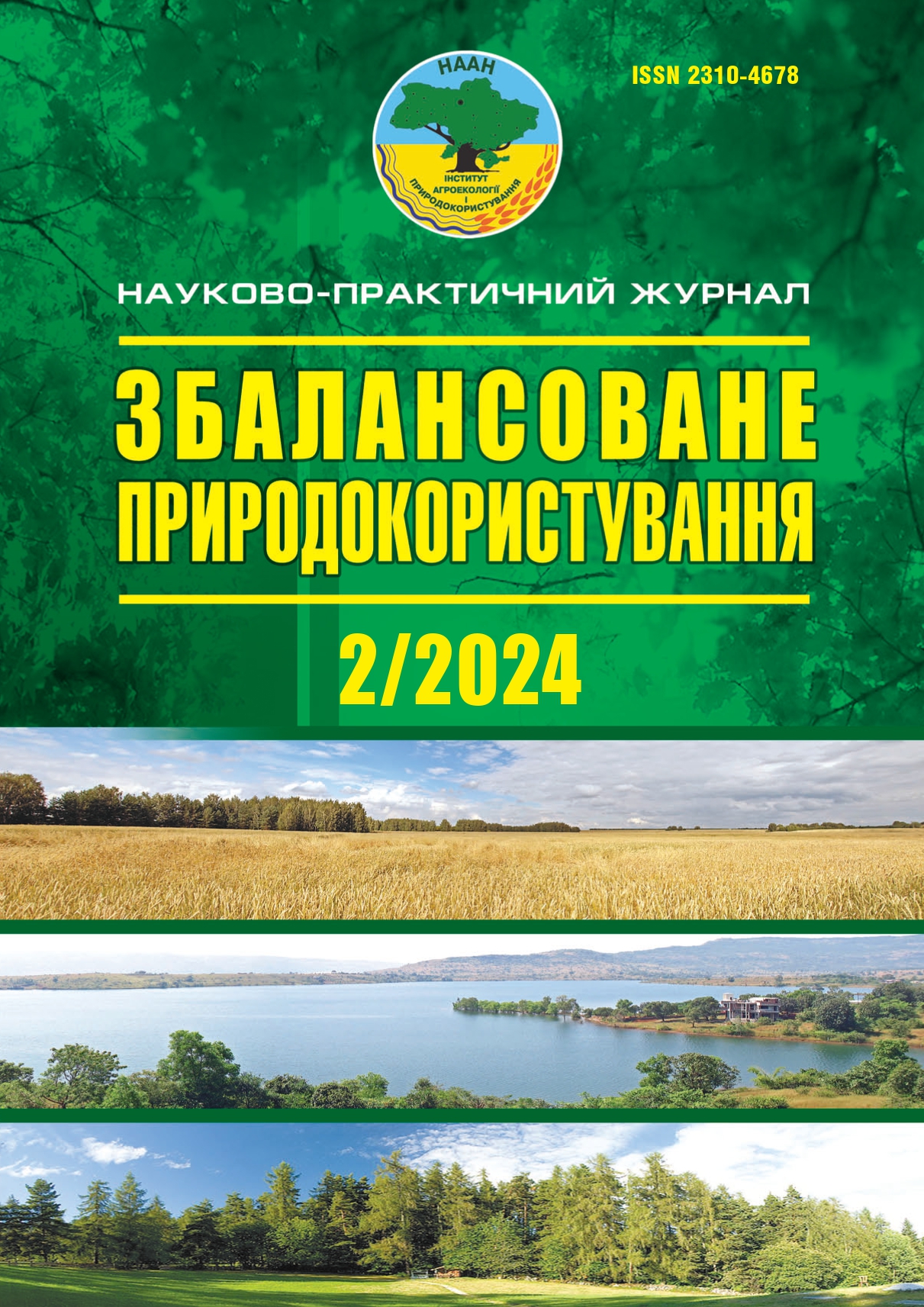METHODOLOGY OF INSTITUTIONAL REGULATION OF COMPLEX DEVELOPMENT OF LAND MANAGEMENT AND ASSESSMENT OF ITS EFFECTIVENESS
DOI:
https://doi.org/10.33730/2310-4678.2.2024.309915Keywords:
economic regulation, institutionalisation approach, ecologisation, management functions and tools, economic conditions of land useAbstract
Modern organizational and economic methods of managing agricultural land use in Ukraine do not ensure its sustainable development, which is reflected in the increasing degradation processes. The current institutional system in Ukraine’s land relations sector is characterized by uncertainty and the lack of clearly established social norms and rules for the ecological management and use of land resources, as well as the roles and statuses of participants in land relations. The absence of a unified national system that meets state and public needs and is supported by an adequate social environment and the ecological awareness of government authorities and citizens hinders the development of effective and competitive agricultural entrepreneurship aimed at creating environmentally clean land resources and producing safe products. A land management system is proposed, where the first level of goal decomposition includes the basic regulatory functions (creation of an ecological network and a system of sustainable land use; forecasting and spatial planning for the use of land and natural resources; development of effective forms of ownership and land use; state support and economic incentives for rational forms of ownership and land use). Regulatory functions, as the main element of the institutional regulation system for the comprehensive development of land management, also serve as the basis for classifying regulatory instruments. The article presents the author’s approach to classifying the instruments of institutional regulation for the comprehensive development of land management according to the basic regulatory functions and their instruments. The institutionalization of land management will contribute to environmentally safe land management in rural areas, the formation of unified land masses, and the reduction of degradation processes. It will also improve the procedures for maintaining land cadastre and monitoring, ensure legislative regulation of access for individuals and legal entities, landowners, and land users to information about land plots and soil quality, which will be used for organizing economic activities, as well as for the economic stimulation of rational land use.
References
Nort, D. (2000). Instytutsii, instytutsiina zmina ta funktsionuvannia ekonomiky [Institution, institutional change and functioning of the economy]. Kyiv: Osnovy [in Ukrainian].
Tretiak, A. Tretiak, V. and Tretiak, N. (2017). Zemelna reforma v Ukrayini: tendenciyi ta naslidky u konteksti yakosti zhyttya i bezpeky naselennya [Land reform in Ukraine: trends and consequences in the context of quality of life and security of the population]. Grin’ D.S., Kherson, Ukraine.
Tretiak, A.M., Tretiak, V.M., Kuriltsiv, R.M., Pryadka, T.M., Kapinos, N.O. and Tretyak, N.A. (2022). Upravlinnia zemelnymy resursamy ta zemlekorystuvanniam [Management of landresources and land raising]. Bilotserkivdruk, Bila Tserkva, Ukraine.
Komarova, N.V. (2019). Problemy Instytutsionalnoho Zabezpechennia Formuvannia Ekolohichno Stiikykh Ahrolandshaftiv v Ukraini. International Journal of Innovative Technologies in Economy, 4 (24), 44–52.
Tretiak, А. and Pryadka, T. (2023). Trend of institutional deve lopment of land managementin rural areas in Ukraine. Agrosvit, 16, 3–10.
Butrym, O., Doroschuk, V., Komarova, N. and Tereschenko, Yu. (2019). Institutional levers of maintenance of ecologicaleconomic efficiency of agricultural land-use. Bulletin of Agricultural Science, 2, 66–73.
Komarova, N.V. (2019). Institutional bases for ensuring economic and economic efficiency of agricultural land use. Balanced Nature Using, 4, 5–16.
Ishchenko, N., Komarova, N. and Skrypnyk, L. (2022). Application of modern technologies in the context of ecologicaland economic justification of land use of the agricultural sector of Ukraine. Agrosvit, 23, 24–31.
Tretiak, A. and Tretiak, V. (2021). Theoretical basis of a modern land use system development in Ukraine. Agrosvit, 1–2, 3—11.
Matvieieva, I., Groza, V., Ischchenko, N., Komarova, N., Skrypnyk, L. and Priadka, T. (2023). The influence of innovative technologies on the dynamics of land use indicators of Ukrainian agricultural enterprises. Economic Engineering in Agriculture and Rural Development, 23, 3, 581–588.
Downloads
Published
Issue
Section
License
- The authors reserve the right to authorship their work and pass the journal the right to publish this work under a Creative Commons Attribution License license, which allows other persons to freely distribute the published work with the obligatory The authors of the original work and the first publication of this magazine.
- The authors have the right to make independent additional agreements on the nonexclusive dissemination of the work in the form in which it was published by this magazine (for example, to post work in the company's electronic storage or to publish as a monograph) , subject to the first publication of the link to this journal.
- Journal policy allows and encourages the placement of authors on the Internet (for example, in the repositories of institutions or on personal websites) manuscript work as to the presentation of this manuscript to the editorial board and during its editorial processing, as it contributes to The productive scientific discussion and positively affects the efficiency and dynamics of citation published work (see The Effect of Open Access).


